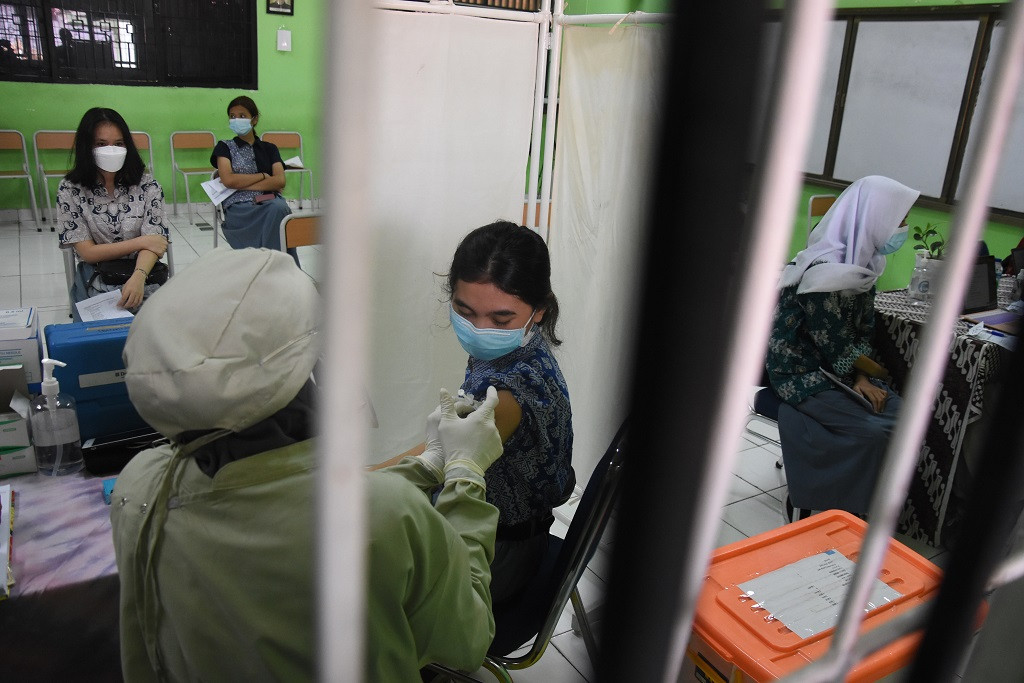Problems persist despite surpassing 100m jabs
Nationwide COVID-19 vaccine coverage for the first dose stood at 33 percent by Thursday, and for the second shot it was around 19 percent. But there is a stark gap in vaccination rates among the 34 provinces, partly blamed on unequal distribution of supply and poor vaccine management.
Change Size

F
undamental problems continue to haunt Indonesia's COVID-19 vaccination drive even after the government hit the so-called milestone of 100 million jabs, about one fourth of the total shots needed to fully vaccinate the target population.
The goal of administering 100 million doses was achieved on Aug. 31, about seven months after the program started, yet fully vaccinated people account for only a small fraction of the milestone.
The rollout began to pick up pace in early June but a high number of regions reported vaccine shortages in late July, with many people complaining that they could not get their second shots as scheduled.
The government now promises to further scale up the rollout, aiming to administer 50 million more shots this month alone. But problems, from vaccine inequity to the slow disbursement of booster shots, persist.
Stark vaccine disparity
Nationwide vaccine coverage for the first dose stood at 33 percent by Thursday, and the second shot around 19 percent.
But there is a stark gap in vaccination rates among the 34 provinces, which is partly blamed on unequal distribution of supply and poor vaccine management.
So far, only the capital Jakarta and Indonesia's main tourist destination of Bali have either all, or almost all, of their target populations vaccinated with at least one dose. The number of people having been fully vaccinated in Jakarta accounts for 81 percent and in Bali 62 percent.
Rates for the first dose in other provinces meanwhile, stood at 25 percent on average and 14 percent for the second dose, far below those of Jakarta and Bali.
Provinces with low levels of vaccination coverage have some of the lowest vaccine supplies.
Lampung, the region with the lowest coverage at 14 percent for the first dose and 8 percent for the second, for example, has so far received around 1.2 million doses of vaccines from the government, with some 500,000 doses remaining in stock. But the province needs around 13.2 million doses of vaccines to fully inoculate its 6.6 million target population.
Vaccine supplies in Jakarta and Bali, on the other hand, are excellent.
Jakarta has 2.7 million doses in stock, more than enough to fully inoculate its remaining 1.9 million target population. Bali, meanwhile, has 1.2 million doses left, slightly lower than the 1.4 million doses needed to fully vaccinate the remaining eligible recipients.
Nationwide, the country needs around 400 million doses to fully vaccinate 208 million eligible recipients by January 2022, as targeted by the government. It had so far procured some 200 million doses from five different vaccine brands, in either ready-to-use or bulk stock, which must be processed into vials of individual doses before it can be administered, according to Coordinating Economic Minister Airlangga Hartarto recently.
Struggling vulnerable groups
The country's vulnerable groups, such as the elderly, indigenous people, people with underlying health conditions and those with disabilities, are among the most impacted by inequity in the vaccination drive.
Vaccination rates for the elderly remain low, even though they are most at risk of dying of the coronavirus. Some 46 percent of 136,400 deaths happened among people over the age of 60, the highest compared with other age groups.
By Thursday, only 25 percent of the 21.5 million elderly population had been fully inoculated.
People in remote, less developed regions, including indigenous populations, are also struggling to get vaccinated due to difficulty in reaching the nearest vaccination centers.
Data from NGO the Indigenous Peoples Alliance of the Archipelago (AMAN) showed that only about 1 percent of 17 million indigenous people across Indonesia had been vaccinated so far.
Read also: Access, accessibility present challenges in vaccinating vulnerable people
Irma Hidayana, a public health expert and cofounder of independent data initiative LaporCOVID-19, said those lingering problems reflected the government's poor vaccination strategy. She said authorities seemed to give less priority to vulnerable groups and instead focused on vaccinating as many people as possible without clear order.
"Instead of following the World Health Organization [WHO] guidelines of jabbing vulnerable groups first before the general public, the government is vaccinating both populations at the same time. This effectively causes vulnerable people to be left behind in the program," she said.
Third dose controversy
The third shot program for 1.5 million health workers is faltering as well, with the Health Ministry missing its own mid-August deadline for completing the program.
So far, only 50 percent of health workers have received their third doses since the campaign started in early August following the deaths of hundreds of frontliners -- many of whom had been fully vaccinated.
Read also: Booster shots for senior officials cause outrage
Making matters worse, it was reported that several high-ranking officials have received third doses despite regulations saying such a booster shot is so far only for medical workers.
Among those who reportedly had been vaccinated with the booster shots are Indonesian Military (TNI) chief Gen. Hadi Tjahjanto, Samarinda Mayor Andi Harun, North Toraja Deputy Regent Frederik Victor Palimbong and his wife, and North Toraja Police chief Adj. Sr. Comr. Yudha Wiradjati Kusuma









